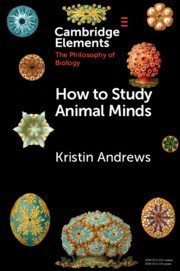Studying the scientists who study comparative psychology
You can learn a lot about the practice of science by reading the introductory textbooks--the outlines of what is worth studying and what is excluded are there in black and white, as are the rules students are supposed to follow. In my book How to Study Animal Minds I analyzed the main textbooks used to teach animal behavior and cognition (and many of my colleagues say they don't use a textbook at all, which is also interesting). I also draw upon twenty years of working with scientists who study animals from dolphins and fish to ravens and orangutans. But the book is really grounded in the feminist philosophy of science I was taught in graduate school, and is deeply influenced by the work of Evelyn Fox Keller, Helen Longino and Mary Midgley. I thank my MA mentor Sylvia Culp for introducing me to this literature, and my PhD advisor Ron Giere for showing me how to study the practice of science.
The book is tiny, but covers a lot. In Chapter 1 I identify and examine including the three principles of comparative psychology: Anti-anthropomorphism, Morgan’s Canon, and Anti-anthropocentrism. In Chapter 2 I argue that that animals should be presumed to be conscious/sentient beings, rather than presumed non sentient. In Chapter 3 I identify how training in comparative psychology creates biases through an emphasis on avoiding bias, such as the bias against forming relationships with research subjects. In Chapter 4 I illustrate the biases in ape cognition studies.
I talked to Marc Bekoff about the book and he recording our conversation on his Psychology Today Animal Emotions blog. And I gave a talk on Chapter 2 of the book for Groupe de recherche en éthique environnementale et animale (GRÉEA) that they recorded (in English, the only language I fluently speak). You can watch that talk, which I called "What comparative cognition can learn from developmental psychology" here.
How To Study Animal Minds. Cambridge Elements in Biology Series, Cambridge University Press, June 2020.




